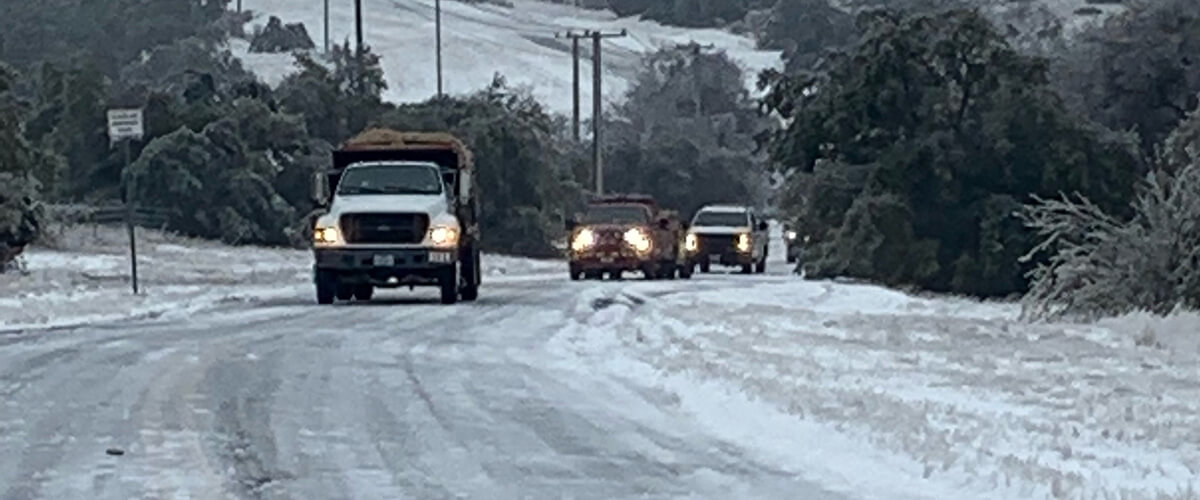“To achieve great things, two things are needed; a plan, and not quite enough time.”
― Leonard Bernstein, composer and conductor
A lot went wrong, with a lot of agencies and services across Texas, during the recent winter storm. One thing that went right was water service in the City of Round Rock. No major outages, no boil water notices for its customers.
The ability to deliver water over the course of the worst winter storm in Central Texas history happened because the City prepares for the worst. Planning is key. But you also need a serious can-do attitude when brutal conditions make your worst-case scenarios look like a stroll through Old Settlers Park. Utilities Director Michael Thane explains:
Planning, teamwork and relentless determination prevailed, but it was close. Really close. Here’s the story of one pivotal moment that kept the City’s water running.
When the power went out at the City’s pumps at Lake Georgetown the backup generator kicked online and the emergency plan was activated. However, the plan anticipates the generator running for less than four hours, because in a typical outage that’s adequate time for the Pedernales Electric Cooperative (PEC) to restore service.
Obviously, last week’s outage was anything but normal.
By Tuesday, Feb. 16, it was clear refilling the 500–gallon diesel tank kept onsite by hauling 100 gallons at a time wasn’t going to keep up with the much-higher-than-anticipated needs of the generators. So we had to get a 1,000–gallon tank out there, and it needed to be full. But how do you do that when the roads are iced over and temperatures are in the single digits?
Teamwork.
Thane, the utility director, contacted General Services Director Chad McDowell, who’s responsible for facilities and vehicles. McDowell’s team located a 1,000 gallon diesel tank – at the Brush Recycle Center, which is operated by Parks and Recreation. Then they needed a truck with right kind of hitch and the towing capacity to handle the 8,000-pound tank – enter the Fire Department. To ensure a successful trip to the pump station – located at the bottom of a hill by the lake – the Transportation Department was tasked to deploy a sanding truck to lead the way. It’s a plan, but with significant risk, according to McDowell:
The plan was finalized Wednesday morning, and in less than two hours the caravan made its way out of Round Rock, down the interstate to Georgetown and then wound its way to the lake – an 11-mile trek on iced-over roads, around a jack-knifed 18-wheeler and finally uphill and downhill to the lake. Here’s Street Superintendent Matt Fitzgerald, who was in the last vehicle in the caravan, describing the journey:
The caravan arrived a little after noon. Within two minutes, the generator ran out of fuel. The generator was refilled, then primed – hold your breath – and fired back up. The pumps begin pushing water, again, to the City’s treatment plant.
Crisis averted.
For the moment.
While all this drama is unfolding, Thane, the Utility Director, was working the phones with the PEC. The generator can only power two pumps, which, in turn, move around 17 million gallons of water a day (MGD) into the system – as the week progressed, water demand rose to 20 MGD. So the City had to get a third pump up and running. The PEC agreed to flow electricity to the pump station – about six hours after the delivery of the big diesel tank.
Naturally, the PEC experienced a hitch getting its equipment up and running in the sub-freezing conditions. Three hours later, Thane got word electricity was flowing again. It was yet another crisis averted, as Thane explains:
The curveballs kept coming as the Utilities Department encountered several other challenges:
- Diesel in Central Texas does not include an additive to keep it from freezing. How the City found enough diesel additive is a whole other story of minor miracles and making your own luck.
- Utility crews had to manually take readings across the distribution system that are usually provided by an electronic monitoring system that encountered technical issues due to the freezing temperatures.
- An employee suited up in self-contained breathing apparatus to stop a chlorine leak in a line that had frozen at the water plant. No chlorine means no drinking water.
- Employees slept at the water plant on cots and worked 16-plus hour days to keep water moving through the pipes.
And on and on, often working in the bitter cold, while many had the same problems at home that you suffered through – no power, busted water pipes, etc. Fitzgerald and Thane describe the attitude of those City employees who stepped up to get the job done:
Ultimately, if those two pumps at Lake Georgetown had been out of service for too long, or that third pump wasn’t brought online, then the water distribution system would have lost pressure.
And losing pressure is a trigger for a boil water notice.
Which never happened, thanks to effective planning, a lot of grit, and a little good fortune along the way.



